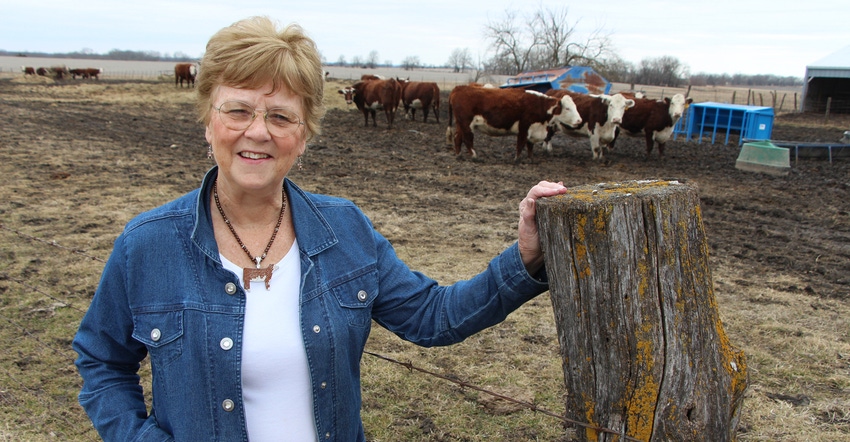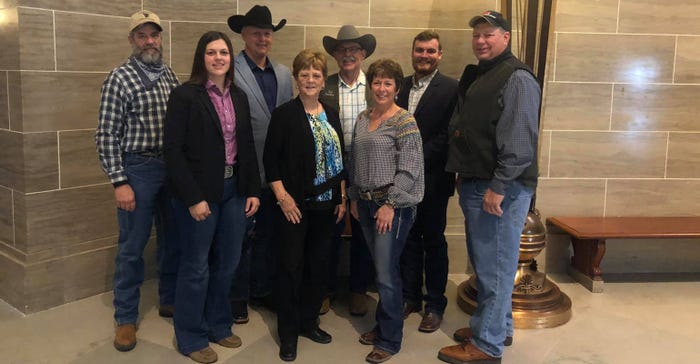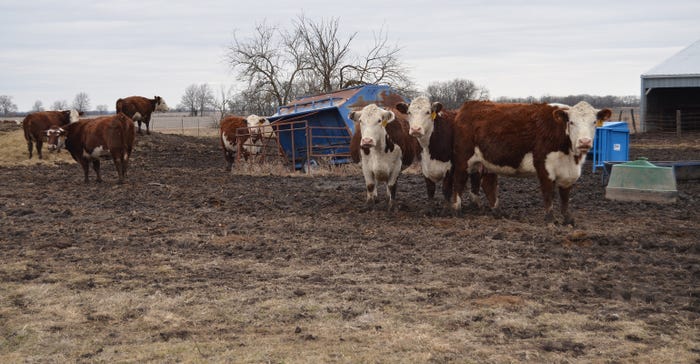
Squares on the linoleum floor were desks. Stuffed animals were students. Then-5-year-old Patty Wood was the teacher. It took 17 more years before she would stand in front of a small rural school as its kindergarten teacher.
“I felt the call to be a teacher,” Wood says. “Farm life came as a gift.” Today, she uses her education and agriculture skill sets to advocate for the state’s cattle industry as the newly elected Missouri Cattlemen’s Association president.
Still, the Pettis County cattle producer does not view herself as only a teacher, but more of a lifelong learner. More importantly, it is how Wood approaches interactions with legislators, beef producers and American consumers.
Early lessons
Wood did not grow up on a large farming operation. “We had two acres and a Shetland pony,” she quips. But her senior year in high school, Wood dated a boy who raised crops and cattle.
“There was never a doubt in my mind that he was the man for me,” she says as her husband, Pat, looks on from across the room. “He’s patient. He is really good at explaining how things worked on the farm.”
Over the past 50 years of marriage, Patty found opportunities to learn every day — from the basics of feeding to the more technical task of pregnancy-checking cows. Today, the couple manages 100 head of production females with a strong Polled Hereford base. The farm located just south of Houstonia, Mo., also raises corn, soybeans and hay.

MAKE A STAND: Missouri Cattlemen’s Association President Patty Wood believes the best way to advance the beef industry is for producers to work together. That includes spending time on the farm with fellow producers talking over issues, as well as in the halls of Jefferson City with policymakers.
The cows all stem from the original line of 20 purebred Polled Herefords owned by Pat’s father. The couple has never purchased a cow. Rather, they improve genetics through bull selection.
A desire to advance the cattle industry led the couple to join the Missouri Cattlemen’s Association in 1971, the month after their wedding. Patty still has the membership form.
“It was one of those things he felt strongly about,” she explains, “that we needed to join the Missouri Cattlemen’s Association because they represented our livelihood. It is important to be a part of an association that supports you; you should support it.”
Helping fellow beef producers
From a simple membership form, the couple spent time volunteering at the local and state level. But it was a call for cattle producers to work the Beef House during the 1982 Missouri State Fair that changed Patty's trajectory in the organization.
“Because we are in close proximity, we were young cattlemen and we both grew up going to the Missouri State Fair, it was an opportunity for us to give back to the association by volunteering our time,” she says.
By 2000, Patty became the Beef House manager. She balanced a full-time job at school with summer work at the Beef House until retiring from education in 2011. Today, she still manages the state fair’s food hot spot.
Patty grew in the organization, taking on leadership roles at the regional level until being elected its president this year. She is not the first female to lead the “cattlemen’s” association. She is actually the third.
While the state also has a Missouri Cattlewomen’s Association, Patty says there are no gender requirements in either organization. The couple is a member of both.
“I think cattle producers, in general, are just supportive of one another,” Patty explains. “They don’t look at [gender]. I’ve had a lot of support over the years.” She credits her fellow cattle producers in Lafayette and Pettis County for giving her the push. “It has been both men and women who encouraged me along the way in leadership roles," she says.
Patty's goal is to bring more cattle producers into the association. “We have less than 5,000 members,” she says, “and we know that there are 50,000 cattlemen across the state. Together, we can accomplish so much more.”
She says the most exciting part of being president is talking with legislators, beef producers and consumers about the industry. Patty spends time in Jefferson City with Cowboys at the Capitol, where producers visit one-on-one with legislators. “We let them know the issues we are facing on the farm and visit about rules and regulations that inhibit growth," she says.
But to reach consumers, she starts when they are young.
Teaching next-gen consumers
An educator by trade, Patty taught kindergarten at the local school for 20 years before working as a library media specialist in nearby Sedalia, Mo., until retirement. In both places, she took advantage of teaching the next generation about food production.
Every fall, she would bring in stalks of corn complete with ears to decorate outside the library entrance. Despite being in a rural community, the kids asked questions.
“I would grab a book and start teaching them about planting corn, tractors and combines,” Patty explains. “Then I would share how this isn’t the corn they eat, but the corn I feed to the cows that turns into hamburgers.”
She carries that same verve into the Beef House every summer. “It was a chance to share with consumers who may not grow up on a farm how their beef is produced,” she says. “There are farmers serving their own product. Who better to answer consumer questions than those cattlemen who produced it?”

LONGEVITY WINS: Cattle roaming the pasture around Pat and Patty Wood’s home farm are from the original purebred Polled Hereford seedstock the family started with in the 1940s. The couple has since used crossbreeding to expand the herd numbers.
Patty adds that COVID-19 brought more interaction between beef producers and consumers. “A lot of consumers thought farmers just had the beef on hand,” she notes. “Some did. But for the most part, we were able to educate them on the time it takes to raise an animal from birth to processing.”
And consumers were willing to listen. “Our producers did it right from their farms,” she says. “It is always great to connect. We are taking every advantage of those interactions to further beef in the marketplace.”
Patty makes the most of educating those who spend time in a legislative office, cattle pasture or chair at the state fair. “I just love sharing what I’ve learned over the years with others,” she says.
It is a far cry from teaching to toys on the kitchen floor.
About the Author(s)
You May Also Like






